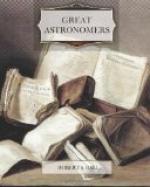I can imagine some one will say, “Oh, there was nothing so wonderful in that; are not planets always being discovered? Has not M. Palisa, for instance, discovered about eighty of such objects, and are there not hundreds of them known nowadays?” This is, to a certain extent, quite true. I have not the least desire to detract from the credit of those industrious and sharp-sighted astronomers who have in modern days brought so many of these little objects within our cognisance. I think, however, it must be admitted that such discoveries have a totally different importance in the history of science from that which belongs to the peerless achievement of Herschel. In the first place, it must be observed that the minor planets now brought to light are so minute that if a score of them were rolled to together into one lump it would not be one-thousandth part of the size of the grand planet discovered by Herschel. This is, nevertheless, not the most important point. What marks Herschel’s achievement as one of the great epochs in the history of astronomy is the fact that the detection of Uranus was the very first recorded occasion of the discovery of any planet whatever.
For uncounted ages those who watched the skies had been aware of the existence of the five old planets—Jupiter, Mercury, Saturn, Venus, and Mars. It never seems to have occurred to any of the ancient philosophers that there could be other similar objects as yet undetected over and above the well-known five. Great then was the astonishment of the scientific world when the Bath organist announced his discovery that the five planets which had been known from all antiquity must now admit the company of a sixth. And this sixth planet was, indeed, worthy on every ground to be received into the ranks of the five glorious bodies of antiquity. It was, no doubt, not so large as Saturn, it was certainly very much less than Jupiter; on the other hand, the new body was very much larger than Mercury, than Venus, or than Mars, and the earth itself seemed quite an insignificant object in comparison with this newly added member of the Solar System. In one respect, too, Herschel’s new planet was a much more imposing object than any one of the older bodies; it swept around the sun in a majestic orbit, far outside that of Saturn, which had previously been regarded as the boundary of the Solar System, and its stately progress required a period of not less than eighty-one years.
King George the Third, hearing of the achievements of the Hanoverian musician, felt much interest in his discovery, and accordingly Herschel was bidden to come to Windsor, and to bring with him the famous telescope, in order to exhibit the new planet to the King, and to tell his Majesty all about it. The result of the interview was to give Herschel the opportunity for which he had so long wished, of being able to devote himself exclusively to science for the rest of his life.
[Plate: View of the observatory, Herschel house, Slough.]




